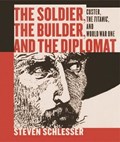Contemporary readers, who wonder at the British and American knack for misguided adventure, will enjoy these three essays on Custer, the Titanic, and the onset of World War I.
The current American adventures in Iraq and Afghanistan are, we hope, winding down after incurring enormous costs. One wonders if we have forgotten the lessons of history, and in particular of World War I? It is far easier to enter into armed conflict than it is to withdraw the troops and heal the wounds.
Soldier, Builder consists of rapier-like literary thrusts into the lives of General George Armstrong Custer, Thomas Andrews (the builder of the Titanic), and Edward Grey (British Foreign Secretary before World War I.
However spectacular their failures, it's generally agreed that these men (or, in the case of Edward Grey, the men around him) could have avoided disaster except for arrogance - a flaw that has long characterized the imperial ambition of leaders from both countries.
One shudders to think where such a mentality will take us in a nuclear age.
Schlesser's readable study is more than entertainment or scholarship, it is a plea for balance, probity, and reason in an era when a single fit of arrogance by a world leader can devastate hundreds of thousands of innocent human beings and imperil the very project of civilized human existence on this planet.
It's difficult to overstate the importance of the Soldier, the Builder, and the Diplomat.

